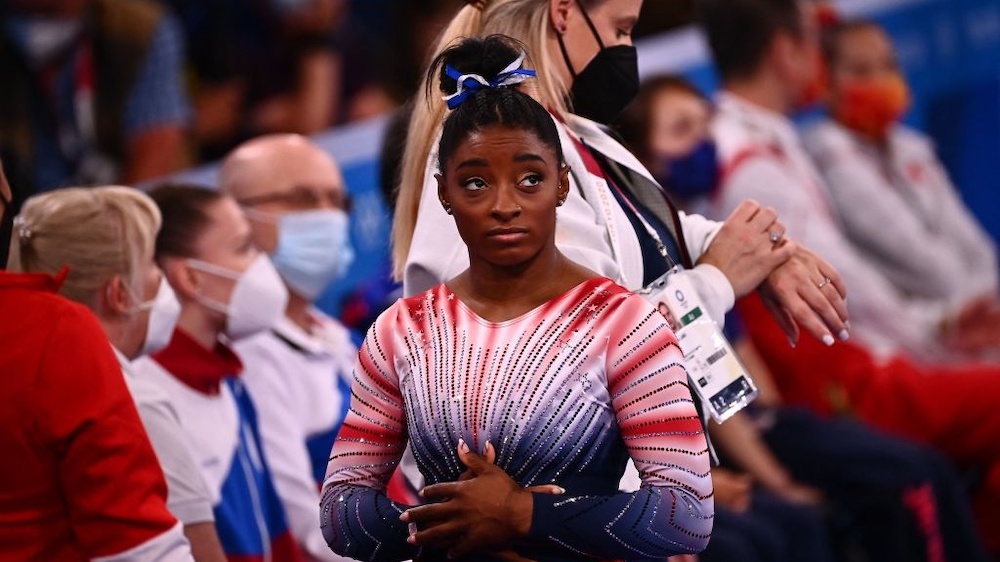If you’re interested in sharing your opinion on any cultural, political or personal topic, create an account here and check out our how-to post to learn more.
Opinions are the writer’s own and not those of Blavity's.
____
When Simone Biles vaults, hearts do flips. When Naomi Osaka returns a serve, expectations explode. When Sha’Carri Richardson leaves the starting block, there is breathless anticipation.
And when they stumble or slip, we are stunned. We need to get over that.
It is time to realize the tremendous pressure on young people like them and prioritize their mental health as well as their physical prowess.
Elite athletes, as Alyssa Richardson wrote recently in The Washington Post, are among the last celebrities whose attainments really do seem beyond those of mere mortals. Over the past century, remarkable young women of color — from Wilma Rudolph to Venus and Serena Williams, to these latest amazing sports stars — have made record-breaking athletic performances a pathway to greatness, and their feats often seem like those of superheroes.
While we do well to admire them, we forget too easily the tremendous physical and personal cost at which their accomplishments come. And we make a terrible mistake when we imagine that their emotional and mental toughness is as effortless as their athleticism seems to be — as the recent experiences of Biles, Osaka and Richardson demonstrate.
Richardson was denied her Olympic shot because she made a choice to self-medicate with marijuana in the face of devastating news about her biological mother’s death. Osaka and Biles got there, but with the weight of the world on their shoulders. Osaka had already recently risked career advancement to insist that she needed space and time for her own wellbeing. Only in recent months has Biles been able to talk about the crippling depression she experienced in the wake of sexual abuse by Larry Nassar, and the extent to which she relies on family who could not be with her in Tokyo.
If most of us fail to comprehend the physical training that it requires to achieve what these athletes achieve, we are even farther from understanding the strains on their hearts and minds. They train relentlessly, and they receive state-of-the-art care for their bodies. Could we at least entertain the possibility that they also need some measure of support for their mental health?
There is an assumption, perhaps even in some cases a racist assumption, that these women are just naturally tough, and that they will win through, working miracles in the face of oppression, Jesse Owens-style. To be sure, rising to the top of their sports while dealing with a lifetime of inequitable treatment demands toughness. And if they make the choice to cultivate toughness, and to place extraordinary demands on themselves mentally and physically in order to achieve greatness, it stands to reason that we are in awe of what they accomplish.
But we are not entitled to pile on. To put these young women in a position from which they actually have to remind us, as all three of these stars have done in the months leading up to the Summer Olympics, that they too are human — that is worse than objectifying them.
We have been doing this for years to women, to young women, and to young women of color, not just in athletics but across a range of human endeavors. What these superstars do is not magic; it is incredibly hard work. It is time for us to hear them say so, and to stop penalizing them for letting their humanity show.
Osaka and Biles and Richardson have been remarkably brave in making themselves vulnerable. They know the risks. For Osaka to say, as she recently has, “It’s OK not to be OK,” or for Biles to find the courage to listen to her own body and mind and make the hard decision to withdraw from the team competition — these are tremendous gestures of generosity and leadership for other young women, indeed for other young people, who are trying to make their way. If it is this hard for people who are world-class competitors and professionals, constantly monitored by performance experts, to signal that something is off for them, how can an “ordinary” young person hope to find the courage?
Frankly, it should not have to be a courageous stance to say, “I need help.” This myth of superhuman emotional endurance, especially for young women of color, is toxic. The more we cultivate the narrative that to strive for excellence in any arena we need to hide our emotional, mental, and spiritual struggles, the more we risk the futures of a generation of young people who are making historic strides.
While youth suicide rates are high in general, recent studies have shown in particular that suicide rates are skyrocketing among young Black women. They need our encouragement to ask for support, not our judgment, or our expectations.
Naomi. Simone. Sha’Carri. It is time to stop simply listing the names of people who have suffered. Let us instead start by thanking them for insisting that what they’re going through is normal, not shameful and not something even the most talented and self-possessed of professionals are exempt from — particularly in the middle of a global pandemic, and utterly unfamiliar circumstances of competition.
Let’s listen to these champions and follow their lead. As we do, we can remind ourselves that all humans — even the ones who are superheroes — deserve support for their mental wellbeing.
____
Stephanie J. Hull, Ph.D. is the president and CEO of Girls Inc.
